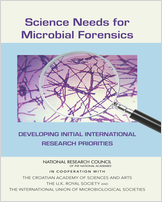NCBI Bookshelf. A service of the National Library of Medicine, National Institutes of Health.
Committee on Science Needs for Microbial Forensics: Developing an Initial International Roadmap; Board on Life Sciences; Division on Earth and Life Studies; National Research Council. Science Needs for Microbial Forensics: Developing Initial International Research Priorities. Washington (DC): National Academies Press (US); 2014 Jul 25.

Science Needs for Microbial Forensics: Developing Initial International Research Priorities.
Show details- Bruce Budowle, Director, Institute of Applied Genetics and Professor, Department of Molecular and Medical Genetics, University of North Texas Health Science Center
- Sampling and Preservation: Commentary Using Food and Agriculture as Examples of Targets for an Attack with a Bioweapon
- Validation and Reference Materials for Microbial Forensics
- Rocco Casagrande, Founder and Managing Director, Gryphon Scientific
- Technologies and Approaches for Identifying Microbes for Law Enforcement: Tools Needed to Support Biological Disarmament
- Jongsik Chun, Associate Professor of Biology, Seoul National University
- Bioinformatics Challenges for Microbial Forensics
- Aaron Darling, Associate Professor in Computational Genomics and Bioinformatics, University of Technology Sydney Faculty of Science's ithree institute
- Big Data and Computing Challenges in Microbial Forensics
- Microbial Ecology and Diversity in the Context of Forensics
- Mats Forsman, Research Director for Biological Analyses, Swedish Defense Research Agency (FOI)
- Commentary: Microbial Forensics—A Swedish Perspective
- Fernando González-Candelas, Full Professor of Genetics, Department of Genetics, University of Valencia
- Molecular Evolution in Court: Analysis of a Large Hepatitis C Virus Outbreak from an Evolving Source
- Adam Hamilton, President and CEO, Signature Science
- Sampling and Handling for Microbial Forensics Applications
- Dag Harmsen, Head of Research, Periodontology Department, University Hospital Münster
- The E. coli O104 Case
- Dana R. Kadavy, Senior Microbiologist, Signature Science
- Forensic Approaches to Microbial Identification
- Paul Keim, Cowden Endowed Chair in Microbiology and Arizona Regents Professor, Northern Arizona University
- The FBI Amerithrax Investigation
- Raymond Lin Tzer Pin, Head and Senior Consultant, Division of Microbiology; Clinical Director, Molecular Diagnostic Centre
- Commentary: Technologies and Approaches for Identifying Microbes in Public Health
- Juncai Ma, Assistant Director of Institute of Microbiology at the Chinese Academy of Sciences (CAS); Deputy Chairman of the Expert Committee on CAS Databases
- The Importance of Reference Collections and the Role of the World Data Center for Microorganisms
- Alemka Markotić, Head, Department for Research, University Hospital for Infectious Diseases, Zagreb, Croatia; Professor at the Medical School of the University of Rijeka and Associate Member of the Croatian Academy of Sciences and Arts
- Clinical and Forensic Approaches to Microbial Identification: Clinical Diagnostic Practices
- Piers Millet, Deputy Head of the Implementation Support Unit, Biological Weapons Convention, United Nations Office for Disarmament Affairs
- Commentary: The Emerging Field of Microbial Forensics
- Stephen A. Morse, Associate Director for Environmental Microbiology, National Center for Emerging and Zoonotic Infectious Diseases, Centers for Disease Control and Prevention, Atlanta, Georgia
- Sampling and Preservation Methods: Public Health Aspects
- Technologies and Approaches for Identifying Microbes in Public Health
- Randall Murch, Professor in Practice, Virginia Polytechnic Institute and State University, Visiting Professor, Department of War Studies, King's College London, UK
- The Trajectory of Microbial Forensics: From Origins to “Grand Challenges”
- Dana Perkins, Expert, Group of Experts, Committee established pursuant to United Nations Security Council Resolution 1540
- Using Microbial Forensics to Strengthen Biosecurity and the Implementation of UN Security Council Resolution 1540
- Dragan Primorac, Adjunct Professor, Eberly College of Science, The Pennsylvania State University, and Henry C. Lee College of Criminal Justice and Forensic Sciences, University of New Haven; Professor, Medical Schools, Split and Osijek, Croatia
- Croatian Accomplishments in Forensics Genetics
- Cerys Rees, Capability Lead, CB Analysis & Attribution, Detection Department, Dstl Porton Down
- Commentary: Sampling and Preservation Methods
- Richard Vipond, Operations Manager for the Rare and Imported Pathogens Laboratory (RIPL), Public Health England, Porton Down
- Heroin-Associated Anthrax Cases 2009/10, 2012 and…
- Haruo Watanabe, Director General, National Institute of Infectious Diseases, Tokyo, Japan
- Commentary: Technologies and Approaches for Identifying Microbes in Public Health
- Ruifu Yang, Beijing Institute of Microbiology and Epidemiology
- What Is Known, in General, About the Ecology of Pathogens Globally
- List of Presentations - Science Needs for Microbial ForensicsList of Presentations - Science Needs for Microbial Forensics
Your browsing activity is empty.
Activity recording is turned off.
See more...